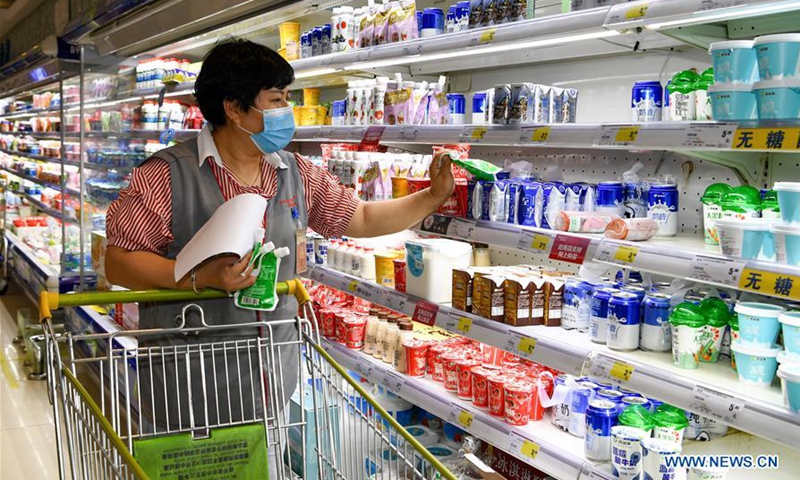Xinjiang epidemic unlikely to affect cross-border trade
By Zhang Hongpei Source: Global Times Published: 2020/7/29 19:38:40

A staff member picks items according to customers' orders at a supermarket in Urumqi, northwest China's Xinjiang Uygur Autonomous Region, July 18, 2020. Local authorities and enterprises in Urumqi are taking various measures to meet residents' need for transportation, medical service, etc. amid efforts to contain the epidemic. (Xinhua/Song Yanhua)
The latest outbreak of coronavirus in Urumqi, capital of Northwest China's Xinjiang Uygur Autonomous Region, has delayed the process of goods and personnel flow between the city and other regions, yet the epidemic's impact on Xinjiang's border trade is limited, local businesses told the Global Times Wednesday.
With trade volume rapidly rising between China and Europe, Urumqi has started to offer a one-stop service that integrates customs clearance, inspection and quarantine, train transportation and freight logistics to cut transportation costs and time.
"Trucks from Urumqi were suspended 10 days ago when the city's COVID-19 outbreak worsened. I have five trucks stranded in the capital city now," the head of a logistics firm surnamed Ma told the Global Times Wednesday. Ma is based in Khorgas, a major inland port in Xinjiang that borders Kazakhstan.
"Products sourced from China's manufacturing hub like Guangdong and Zhejiang provinces arrive in Urumqi first, and are then transported to the port city from where they are shipped to Europe," Ma said.
Urumqi reported 89 new confirmed cases of coronavirus infection and 15 asymptomatic cases Tuesday, local health authority data showed.
The outbreak in Urumqi is linked to a group activity, but the actual origin of the latest cluster of infections is still unknown.
The city has entered "wartime mode" for epidemic prevention and control. All gatherings and public activities were halted, and communities are under closed management.
The current disruptions of goods and personnel flow caused by the latest outbreak, however, is unlikely to affect much of Xinjiang's foreign trade which goes through Khorgas via the China-Europe freight trains, Ma said, given the increasing amount of freight from other Chinese cities.
Xinjiang, China's northwest doorway to Central and West Asia, sits along the ancient Silk Road. With more and more freight trains connecting Chinese and European cities, Xinjiang has turned from a remote border region into a forefront for international logistics services.
Outbound freight trains via Khorgas include 16 lines departing from Lianyungang, East China's Jiangsu Province, Chengdu, capital of Southwest China's Sichuan Province and Zhengzhou, capital of Central China's Henan Province.
Chen Haiou, president of the China-Pakistan Border Trade Zone Management Co, told the Global Times Wednesday that rail freight has increased in the first half of the year in Xinjiang since some orders which were due to travel by sea have been transshipped by rail transport due to delays caused by COVID-19.
The latest data from the railway port of Khorgas shows that the import and export freight volume of the port was 2.57 million tons, up 48 percent on a yearly basis.
Since the resumption of the economy, China-Europe freight trains have resumed normal operations. The China-Europe (Central Asia) trains bound for Khorgas have given new hope to foreign trade affected by the pandemic.